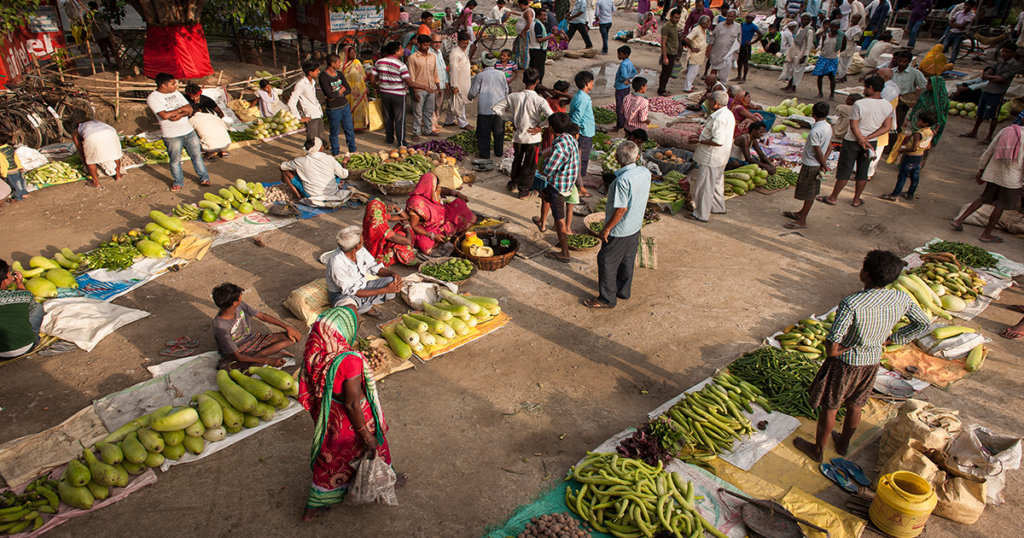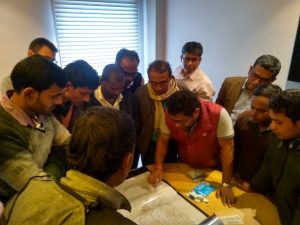By: Dr Gregory Cooper, Research Fellow, SOAS, University of London

According to the National Sample Survey Organisation (NSSO), average fruit and vegetables (F&V) consumption in Bihar equalled 132 g/capita/day in 2011-2012. Therefore, people in Bihar on average consume approximately one-third of the global recommendation of 400 grams/capita/day (FAO and WHO, 2014). In turn, consumers dependent upon nutritionally vulnerable markets (i.e. those that are traditional, small and often rural) are likely to face the greatest challenges to fruit and vegetable access and affordability.
Digital Green’s ‘Loop’ project aims to help farmers save time and reduce the cost of transporting their vegetable produce to market. In Loop, an aggregator collects and markets fruits and vegetables on behalf of farmers – optimising transport based on the volume of produce. The model leverages digital technology to ensure transparency, efficiency and trust between the aggregator and farmer, which in turn enables better negotiation power for bulk selling in most cases. It also saves the farmer market transport costs and allows them to reinvest the time and money into on-farm and recreational activities.
The Market Intervention for Nutritional Improvement (MINI) project, funded by the Bill & Melinda Gates Foundation (BMGF) and the UK Department for International Development (DfID), aims to explore the nutritional aspects of the market and technical interventions in vegetable and poultry value chains in Bihar and Bangladesh. Led by the School of Oriental and African Studies (SOAS, University of London) and the International Livestock Research Institute (ILRI, Vietnam), the project involves researchers from the London School of Hygiene and Tropical Medicine (LSHTM), Bangladesh Agricultural University (BAU, Dhaka) and Lincoln University, New Zealand, as well as Sadman Sadek, Vinay Rana, Dr Nadagouda and Namita Singh from Digital Green (amongst others!).

The research focuses on the ways in which aggregation schemes (such as Loop) may be made more nutritionally sensitive – which refers to the availability and affordability of F&V in some of the more rural, traditional and retail-based markets. However, achieving this goal is not a case of simply sending greater volumes of F&V towards smaller markets. This is owing to various conditions and feedbacks that make rural markets less attractive to farmers and consumers alike, including less developed transport and market infrastructures, inferior market capacities and the typically weaker purchasing power of rural consumers. As a consequence, we need to think carefully about how the aggregation system such as Loop may be utilised to minimise trade-offs and achieve ‘win-win’ scenarios for both farmers and consumers.
The MINI project takes a multidisciplinary approach to the research problem. To date, rapid value chain analyses in Bihar, India and Jessore district, Bangladesh, have identified the key actors involved in the respective horticultural value chains. From here, survey campaigns interviewed 360 farming households in both Bihar and Bangladesh. In Bhojpur and Muzaffarpur districts, Bihar, we tentatively find that Loop farmers on average produced and sold higher quantities of F&V relative to farmers that had not participated in Loop between 2018-2019 (please note: this result is not final and yet to be tested with robust econometrics). Through common econometric techniques, the research team is currently investigating the extent to which these outcomes can be attributed to Loop participation, as well as the various socioeconomic factors that might determine Loop participation in the first place.
System dynamics modelling builds upon the value chain analyses and household surveys. Working alongside the experts at Digital Green and select groups of farmers, traders and commission agents in Bhojpur and Muzaffarpur, the MINI project team have built a system dynamics model to simulate the future evolution of Loop under various scenarios. These scenarios range from internal changes to Loop (e.g. scaling-up farmer numbers and transport subsidies) to making changes within the wider enabling environment – such as the introduction of accessible cold storage facilities in F&V markets.

The start of 2020 sees the MINI project beginning to apply the same techniques to the homestead poultry programme run by JEEViKA in Bihar. Whilst JEEViKA’s poultry programme initially focused on improving household nutrition (e.g. through chicken meat and egg consumption), the MINI project and Digital Green are interested in the potential market linkages and opportunities to expand the poultry programme for nutritional benefits beyond the household scale. This analysis will run in parallel with a similar project based in Ghana, led by Dr Karl Rich (ILRI), to ultimately evaluate whether a pioneering aggregation model such as Loop might bring about nutritional benefits in poultry value chains and markets.
About the Author:
Dr Gregory Cooper is a Postdoctoral Research Fellow at the Centre for Development, Environment and Policy (CeDEP), SOAS, University of London. Follow the story of the research project here on his blog.
A more detailed interview on the MINI research project can be found here in a series of 3 articles: Unravelling value chains through participatory modelling: Part 1, Part 2 & Part 3
